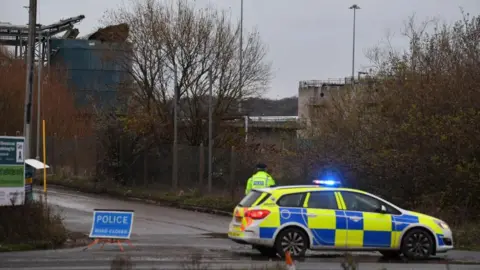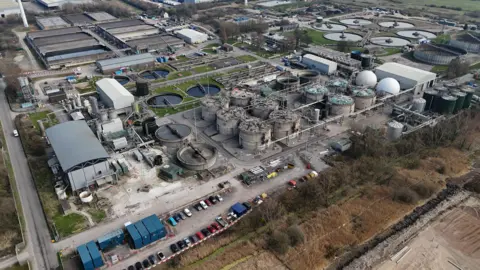Avonmouth explosion risk was flagged years before fatal blast
Meanwhile, families and colleagues continue to wait for answers as the HSE has yet to release its findings, which are unlikely to come before July this year.
Coming forward to BBC West's investigations team, the reports' author said that following his inspections in 2014 and 2015 he would not have been happy for one of his family members to work there.
"Four years on, I thought... there would be some sort of closure for the families," he said.


The reports are highly technical and raised a number of safety issues in 2014 and 2015. The claims include:
Another concern was the alleged emission of hydrogen sulfide (H₂S), which the report described as a "serious risk to personnel". H₂S is a toxic gas that, in high concentrations, can be lethal.
The author said: "It wasn't just the explosive atmosphere, it was the toxic atmosphere created by the valves venting.
"Any gas discharge will create a hazardous environment or potentially a hazardous environment."


The reports also state that none of the vessels they looked at were fitted with flame arresters – safety devices designed to stop flames from igniting flammable gases.
While some industry experts consider these essential, others believe they are not always necessary and there is no legal obligation to fit them.
The reports' author said: "I think all the digesters should have flame arresters.
"The industry seems to oppose it, but flame arresters... would have prevented a spark being taken back into the vessel and causing a large explosion."
The BBC has not been able to establish whether Wessex Water took remedial action between these warnings in 2015 and the explosion in 2020. It is not clear whether the silo that exploded was fitted with a flame arrester at any point.
In January 2024 - three years after the explosion - the Health and Safety Executive served the company with an Improvement Notice.
It said: "The operator has failed to demonstrate... that it has taken all measures necessary to prevent major accidents and limit their consequences.
"Their Major Accident Prevention Policy does not address the necessary measures and major hazards management system elements required."
In response, Wessex Water said the notice was "unrelated to the subject matter of the reports" and that the HSE was "satisfied" with steps taken by the company and confirmed compliance on 9 February 2024.


The author of the reports confirmed his findings were shared with management at Wessex Water in 2014/15 and said he believed that the issues were a systemic failure, rather than the fault of staff on the ground.
"I think they didn't do the correct assessment... on the complete system from start to finish," he said.
He believes high levels of gas were produced in the holding tank that exploded, which may have been ignited by a spark on the day of the incident.
Many industry figures and Wessex Water staff have been reluctant to comment publicly for fear of jeopardising future work in an industry with few employers.
One, who studied the reports but spoke on condition of anonymity, said: "I'm looking at this thinking I wouldn't want to operate this plant. There are too many things wrong.
"The number of places they're venting gas from is scary. If these reports are even half correct, then this was an accident waiting to happen."
Another source, who knows the Avonmouth site well, said safety problems in the industry were widely known before the explosion.
He said: "It feels like the whole water industry was working to the wrong standard.
"We always thought it would be one of the other water companies [where there would be a disaster] but it was us."
He added that safety had improved dramatically in the years following the fatal blast.
The Health and Safety Executive said it could not comment on the BBC's findings because its investigation remained "live".


The exact cause of the explosion has not yet been made public.
But Prof Clifford Jones, a specialist in combustion risk at the University of Chester, said dust released from the storage silo could have been ignited by a spark.
He said: "There might have been an area at the top of the silo of high concentration of dust. That would have been susceptible to a spark.
"Methane which was there would make [the explosion] all the more powerful."
For the families of those who lost their lives, the community in Avonmouth and the water industry more broadly, the wait for answers will hopefully come to an end when the HSE publishes its investigation later this year.









